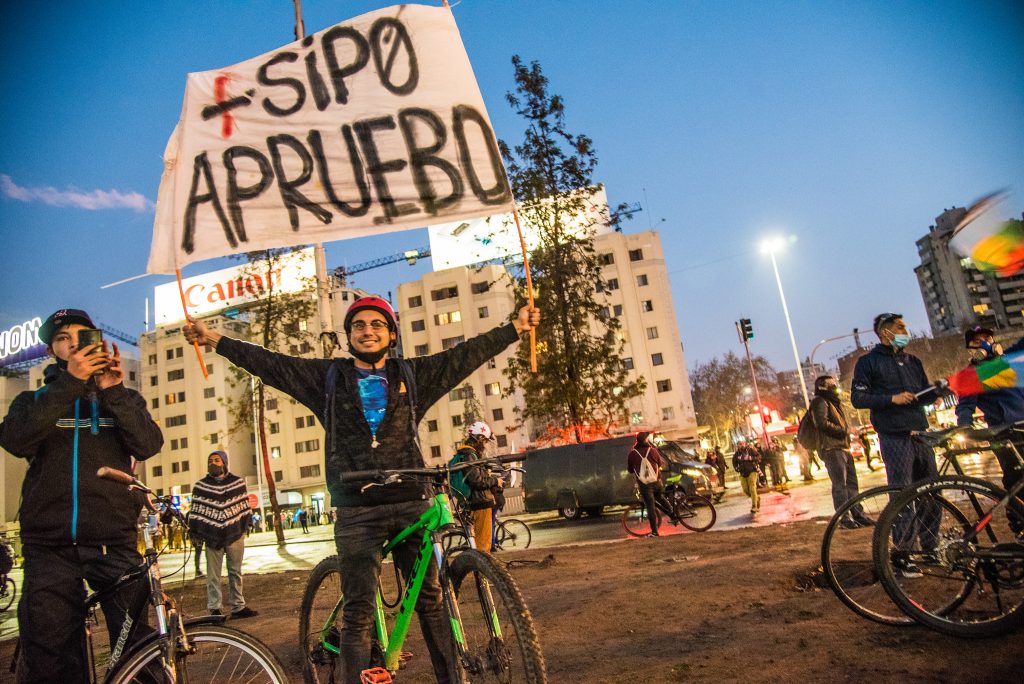
Chile’s constitutional referendum: the opportunity to set Pinochet’s legacy aside
Author: Francisco Espinoza
Leaving behind the Constitution implemented by the civic-military dictatorship led by Augusto Pinochet has not been an easy task for Chileans. The current Chilean constitution (hereafter, the Constitution) – commissioned by the military junta to a small group of lawyers and ratified in a fraudulent referendum in 1980 – was not withdrawn either during or after the process of transition to democracy, mostly due to the strong anti-democratic clauses that constricted its modification. Forty-two years after the implementation of the current Constitution, their citizens will have the opportunity to approve or reject a new text on the 4th of September.
How have Chileans come to change the Constitution if it remained stable for over four decades? In October 2019, a $30 Chilean peso rise in public transport fee (£0.03) triggered student protests in Santiago, the capital city. The dismissive tone of the authorities to the criticism of the increase of cost of living and the strong police repression under the watch of the right-wing government of Sebastián Piñera caused more popular anger. Riots expanded quickly throughout the whole country and a plurality of demands crystallised under the motto of ‘dignity’, ranging from a new constituent assembly, changes in economic policy, the expansion of social rights (e.g., health, education and housing), to better job opportunities and feeling respected by authorities. In a scenario where the government did not offer a policy response other than police repression, most party leaders agreed to call for a referendum on the writing of a new constitution and the mechanism as a democratic path to canalise the crisis.
Faced with this historical opportunity, I firmly believe that my fellow Chilean compatriots should vote in favour of the new Constitution. In the first place, the new draft allows us to leave behind a cornerstone of the republic’s authoritarian legacy and replace it by a Constitution written under democratic mechanisms. Despite a series of reforms, the current Constitution maintains an authoritarian core. Secondly, the process has been widely inclusive, permitting representation and participation through innovative mechanisms in the world. Thirdly, and contrary to the current text which prevents democratic debate, the new draft creates space for democratic discussion and expands the scope of democracy. Finally, approving the new constitution is the wisest choice as the rejection of the draft destroys the only formal institutional change resulting from the protests.
In this referendum, Chileans have the opportunity to replace the Constitution that holds the legal apparatus of their country’s authoritarian past. While the amendments eliminated authoritarian institutions (including the existence of senators-for-life, which permitted Pinochet to secure a seat in Congress), the current constitution still maintains the supermajoritarian quorums and allows preventive control of bills by a Constitutional Court. Along with the Constitution, a large range of laws with Constitutional range signed during the dictatorship restricts modifications to education policy, regulation of mines, the police or the military. Paraphrasing Jaime Guzmán, a Constitutional lawyer and one of the military junta closest advisors, the aim was to restrict the range of action for the adversaries of the dictatorship, forcing them to act in a way not so different from what the authoritarian regime would do (Guzmán, 1979).
Social organisations have urged the need for a new Constitution since the return to democracy in 1990, and the demand became part of the repertoire of mass protests since the early 2010s. During the 2019 protests, legislators offered a mechanism for conflict resolution and the proposal of a call for a referendum gained support from 127 of 155 deputies. Contrary to what critics have tried to promote, this Constitutional replacement is not the result of a democratic collapse. While the riots increased the cost for legislators of denying the implementation of a Constitutional Assembly, the process has followed the rules established by a large cross-bench agreement in Congress. The subsequent protocols were largely discussed during months. As a result, the ongoing Constitutional process has been legally implemented and authorised by the rules established by the Legislative power.
Secondly, the process sets an incredible record for representation, participation and inclusivity. In terms of descriptive representation, the Constitutional Convention included seats for indigenous people and it has been the only assembly in the world with gender equity among elected representatives. Alongside the democratically elected members were Constitutional experts, lawyers, teachers, journalists and spiritual leaders, among other occupations. Concerning public engagement, all committees involved public audiences, with representatives reporting 16,424 public meetings and 2,833 private audiences. Almost one million people signed popular initiatives of constitutional norm and 78 of those proposals were discussed.
Thirdly, this Constitutional draft expands the possibilities of democratic debate. The immediate benefit is the reduction of the supermajoritarian quorums needed for Constitutional reform. In addition, its implementation will eliminate restrictions to the range of action of legislators. For instance, the Congress will be able to discuss all those matters falling out of the scope of the new Constitution. More importantly, this proposal decentralises the power from the central government by guaranteeing devolved powers to the regions and increases the power of citizens by allowing popular initiative.
Finally, the process permits the continuation of an institutional path for social reform that is less certain if the draft is rejected. In 2020, Chileans voted that the country needed a new Constitution (78.3%) written by a fully elected Convention (79.2%). The rejection of this draft, instead, would drive the country back to a point of uncertainty. From the referendum mandate, it would be expected that a new Convention have to sit until a new Constitution is approved. Nonetheless, conservative representatives in Congress can block any initiative of further reform, in the same way as they have made it in these three decades. Thus, the possibilities of change depend on the approval of this new draft.
Of course, neither the process nor the proposal itself are perfect. Representatives did not modify radically the ‘engine room’ of the Constitution and the expansion of social rights in the Constitution will not be implemented immediately, as it may take a long time before they are universally accessible. Nonetheless, this is an incredible opportunity for the country. In less than one year of sessions, the Constitutional Convention made an enormous effort in writing a draft that makes space for the aspirations of a whole country. Chileans can set the authoritarian legacy aside and approve a proposal that is one for the future and democracy.
Short bio

Francisco Espinoza is a PhD student in Politics at the University of Manchester. His thesis focuses on political behaviour in Latin America during the last two decades. In particular, he is interested in the differentiated effects of economic deterioration during and after the so-called ‘turn to the left’ in the region. Broader research interests include Latin American and Chilean politics; political identities; and LGBT+ activism.
Contact: francisco.espinoza@manchester.ac.uk
Twitter: @fcoespin_
Bibliography
Ruiz, C. (2020). Octubre chileno: La irrupción de un nuevo pueblo. Taurus.
Escudero, M. C. (2021). Making a Constituent Assembly Possible in Chile: The Shifting Costs of Opposing Change. Bulletin of Latin American Research, https://doi.org/10.1111/blar.13290
Gargarella, R. (2022, July 16). El proyecto de dejar atrás la “Constitución de Pinochet”. LA NACION.https://www.lanacion.com.ar/opinion/el-proyecto-de-dejar-atras-la-constitucion-de-pinochet-nid16072022/
Grez Toso, S., Opazo, D., & Vidal Molina, P. (Eds.). (2018). Ciudadanías para la democracia: Reflexiones desde la problemática constitucional y constituyente chilena del siglo XXI. Ariadna.
Guzmán, J. (1979). ‘El camino político’, Revista Realidad, 1(7):13-23.
Heiss, C. (2020). ¿Por qué necesitamos una nueva constitución? AGUILAR.
Mac-Clure, O., Barozet, E., Conejeros, J., & Jordana, C. (2020). Escuchando a los chilenos en medio del estallido: Liberación emocional, reflexividad y el regreso de la palabra “pueblo”. CIPER Académico, 2, 2020.
Negretto, G. L. (2015). Procesos constituyentes y refundación democrática: El caso de Chile en perspectiva comparada. Revista de Ciencia Política (Santiago), 35(1), 201–215. https://doi.org/10.4067/S0718-090X2015000100010
Negretto, G. L. (2021). Deepening Democracy? Promises and challenges of Chile’s Road to a New Constitution. Hague Journal on the Rule of Law, 13(2), 335–358. https://doi.org/10.1007/s40803-021-00158-2
Piscopo, J. M., & Siavelis, P. M. (2021). Chile’s Constitutional Moment. Current History, 120(823), 43–49.https://doi.org/10.1525/curh.2021.120.823.43
Image credits
Title: Manifestación Plaza de la Dignidad
Date: 4th September 2020
Author: Paulo Slachevsky
Permission: this file is licensed under the Creative Commons Attribution-Share Alike 2.0 Generic (CC BY-NC-SA 2.0)

0 Comments